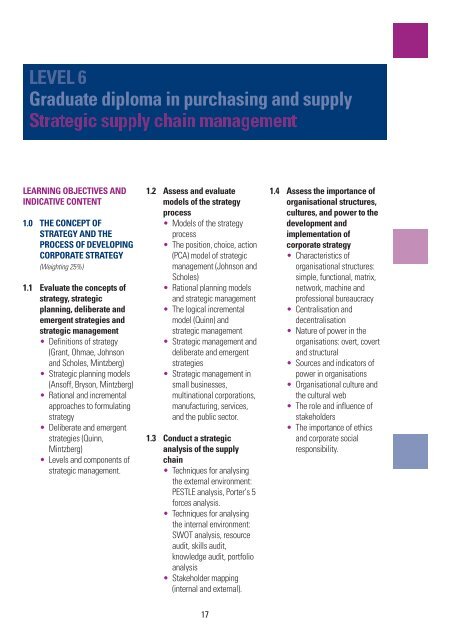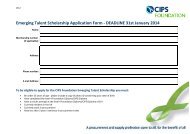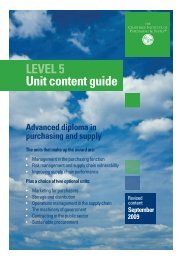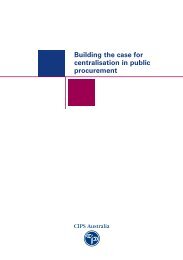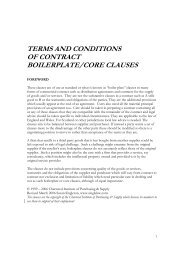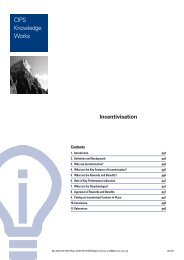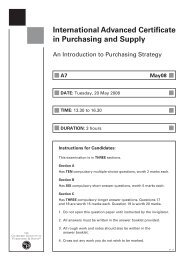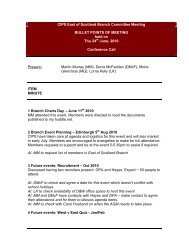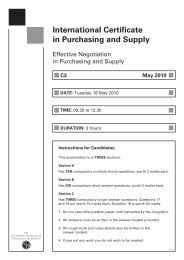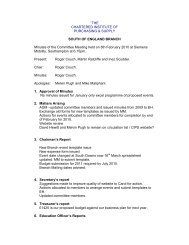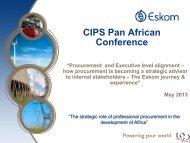Graduate diploma - The Chartered Institute of Purchasing and Supply
Graduate diploma - The Chartered Institute of Purchasing and Supply
Graduate diploma - The Chartered Institute of Purchasing and Supply
You also want an ePaper? Increase the reach of your titles
YUMPU automatically turns print PDFs into web optimized ePapers that Google loves.
LEARNING OBJECTIVES AND<br />
INDICATIVE CONTENT<br />
1.0 THE CONCEPT OF<br />
STRATEGY AND THE<br />
PROCESS OF DEVELOPING<br />
CORPORATE STRATEGY<br />
(Weighting 25%)<br />
1.1 Evaluate the concepts <strong>of</strong><br />
strategy, strategic<br />
planning, deliberate <strong>and</strong><br />
emergent strategies <strong>and</strong><br />
strategic management<br />
• Definitions <strong>of</strong> strategy<br />
(Grant, Ohmae, Johnson<br />
<strong>and</strong> Scholes, Mintzberg)<br />
• Strategic planning models<br />
(Ans<strong>of</strong>f, Bryson, Mintzberg)<br />
• Rational <strong>and</strong> incremental<br />
approaches to formulating<br />
strategy<br />
• Deliberate <strong>and</strong> emergent<br />
strategies (Quinn,<br />
Mintzberg)<br />
• Levels <strong>and</strong> components <strong>of</strong><br />
strategic management.<br />
1.2 Assess <strong>and</strong> evaluate<br />
models <strong>of</strong> the strategy<br />
process<br />
• Models <strong>of</strong> the strategy<br />
process<br />
• <strong>The</strong> position, choice, action<br />
(PCA) model <strong>of</strong> strategic<br />
management (Johnson <strong>and</strong><br />
Scholes)<br />
• Rational planning models<br />
<strong>and</strong> strategic management<br />
• <strong>The</strong> logical incremental<br />
model (Quinn) <strong>and</strong><br />
strategic management<br />
• Strategic management <strong>and</strong><br />
deliberate <strong>and</strong> emergent<br />
strategies<br />
• Strategic management in<br />
small businesses,<br />
multinational corporations,<br />
manufacturing, services,<br />
<strong>and</strong> the public sector.<br />
1.3 Conduct a strategic<br />
analysis <strong>of</strong> the supply<br />
chain<br />
• Techniques for analysing<br />
the external environment:<br />
PESTLE analysis, Porter’s 5<br />
forces analysis.<br />
• Techniques for analysing<br />
the internal environment:<br />
SWOT analysis, resource<br />
audit, skills audit,<br />
knowledge audit, portfolio<br />
analysis<br />
• Stakeholder mapping<br />
(internal <strong>and</strong> external).<br />
17<br />
1.4 Assess the importance <strong>of</strong><br />
organisational structures,<br />
cultures, <strong>and</strong> power to the<br />
development <strong>and</strong><br />
implementation <strong>of</strong><br />
corporate strategy<br />
• Characteristics <strong>of</strong><br />
organisational structures:<br />
simple, functional, matrix,<br />
network, machine <strong>and</strong><br />
pr<strong>of</strong>essional bureaucracy<br />
• Centralisation <strong>and</strong><br />
decentralisation<br />
• Nature <strong>of</strong> power in the<br />
organisations: overt, covert<br />
<strong>and</strong> structural<br />
• Sources <strong>and</strong> indicators <strong>of</strong><br />
power in organisations<br />
• Organisational culture <strong>and</strong><br />
the cultural web<br />
• <strong>The</strong> role <strong>and</strong> influence <strong>of</strong><br />
stakeholders<br />
• <strong>The</strong> importance <strong>of</strong> ethics<br />
<strong>and</strong> corporate social<br />
responsibility.


